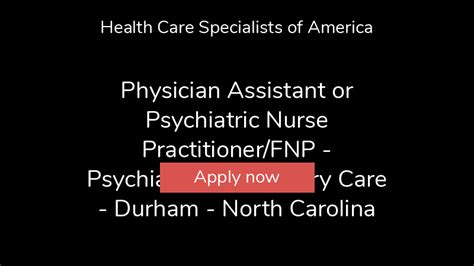Intro
The demand for mental health services has increased significantly over the years, leading to a growing need for skilled healthcare professionals who can provide high-quality care to individuals with mental health conditions. One such profession that has gained popularity in recent years is the psychiatric physician assistant (PA). In this article, we will explore the job opportunities and career outlook for psychiatric physician assistants, as well as the benefits and challenges associated with this career path.
What is a Psychiatric Physician Assistant?

A psychiatric physician assistant is a healthcare professional who works under the supervision of a licensed psychiatrist or other qualified healthcare provider to provide mental health services to patients. Psychiatric PAs are trained to diagnose and treat mental health conditions, such as anxiety, depression, and bipolar disorder, as well as to prescribe medications and order diagnostic tests. They may work in a variety of settings, including hospitals, clinics, private practices, and community mental health centers.
Job Opportunities for Psychiatric Physician Assistants

The job market for psychiatric physician assistants is highly competitive, with a growing demand for skilled professionals in this field. According to the Bureau of Labor Statistics (BLS), employment of physician assistants, including psychiatric PAs, is projected to grow 31% from 2020 to 2030, much faster than the average for all occupations.
Some of the top job opportunities for psychiatric physician assistants include:
- Inpatient psychiatric units: Psychiatric PAs may work in inpatient psychiatric units, where they provide care to patients who require hospitalization for mental health conditions.
- Outpatient mental health clinics: Psychiatric PAs may work in outpatient mental health clinics, where they provide care to patients who do not require hospitalization.
- Private practices: Psychiatric PAs may work in private practices, where they provide care to patients who have private insurance or pay out-of-pocket for services.
- Community mental health centers: Psychiatric PAs may work in community mental health centers, where they provide care to patients who may not have access to mental health services otherwise.
Specialized Roles for Psychiatric Physician Assistants
In addition to these traditional job opportunities, psychiatric physician assistants may also pursue specialized roles, such as:
- Addiction medicine: Psychiatric PAs may work in addiction medicine, where they provide care to patients who are struggling with substance use disorders.
- Forensic psychiatry: Psychiatric PAs may work in forensic psychiatry, where they provide care to patients who are involved in the legal system.
- Child and adolescent psychiatry: Psychiatric PAs may work in child and adolescent psychiatry, where they provide care to patients who are under the age of 18.
Career Outlook for Psychiatric Physician Assistants

The career outlook for psychiatric physician assistants is highly favorable, with a growing demand for skilled professionals in this field. According to the BLS, the median annual salary for physician assistants, including psychiatric PAs, was $112,260 in May 2020.
Some of the benefits of a career as a psychiatric physician assistant include:
- Job satisfaction: Psychiatric PAs report high job satisfaction, as they are able to make a positive impact on patients' lives.
- Variety: Psychiatric PAs may work in a variety of settings and with a variety of patients, which can make for a interesting and challenging career.
- Opportunities for advancement: Psychiatric PAs may have opportunities for advancement, such as moving into leadership roles or pursuing specialized certifications.
However, there are also some challenges associated with a career as a psychiatric physician assistant, including:
- Emotional demands: Working in mental health can be emotionally demanding, as psychiatric PAs may work with patients who are experiencing trauma or other mental health challenges.
- High stress levels: Psychiatric PAs may experience high stress levels, particularly in high-pressure settings such as emergency departments or inpatient psychiatric units.
- Continuing education requirements: Psychiatric PAs must complete continuing education requirements to stay up-to-date with the latest developments in mental health care.
Conclusion
A career as a psychiatric physician assistant can be highly rewarding, with a growing demand for skilled professionals in this field. While there are some challenges associated with this career path, the benefits of a career as a psychiatric PA make it an attractive option for those who are passionate about mental health care.
If you are considering a career as a psychiatric physician assistant, here are some next steps you can take:
- Research programs: Research programs that offer training in psychiatric physician assisting.
- Gain experience: Gain experience in mental health care, either through volunteering or working in a related field.
- Network: Network with psychiatric PAs and other mental health professionals to learn more about the field.
By taking these steps, you can position yourself for success in this rewarding and challenging career.
What is the average salary for a psychiatric physician assistant?
+The average salary for a psychiatric physician assistant is around $112,260 per year, according to the Bureau of Labor Statistics.
What kind of training do I need to become a psychiatric physician assistant?
+To become a psychiatric physician assistant, you will need to complete a master's degree program in physician assisting and obtain certification through the National Commission on Certification of Physician Assistants (NCCPA).
What are some of the benefits of a career as a psychiatric physician assistant?
+Some of the benefits of a career as a psychiatric physician assistant include job satisfaction, variety, and opportunities for advancement.
